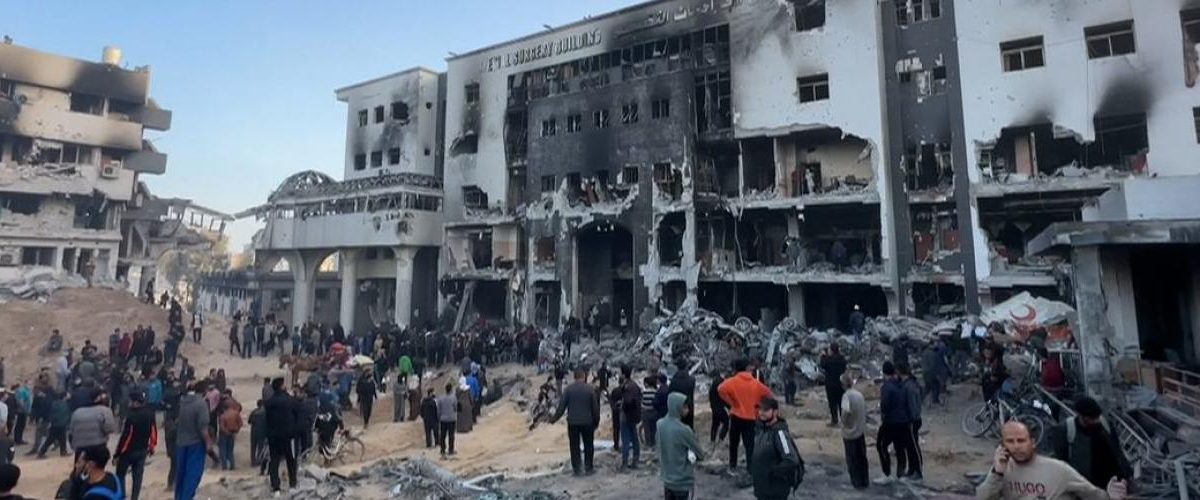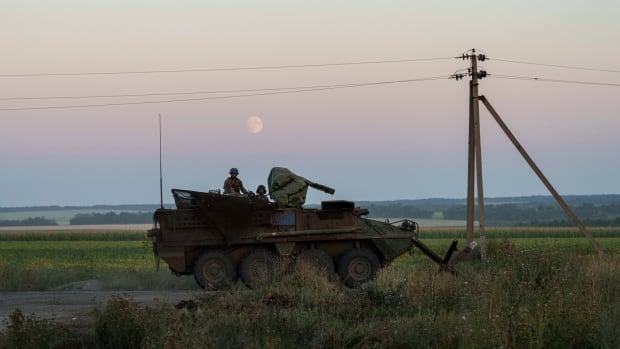The latest:
- Iran warns of further attacks if Israel retaliates.
- Israel will exact price from Iran when time is right, minister says.
- Israel reports modest damage as most missiles and drones intercepted.
- Calls grow for Canada to add Iran’s Revolutionary Guard to terror list.
- Some airlines cancelling and rerouting flights in the region.
U.S. President Joe Biden warned Israeli Prime Minister Benjamin Netanyahu that the U.S. will not take part in a counter-offensive against Iran, if Israel decides to retaliate for a mass drone and missile attack on Israeli territory overnight, U.S. officials said.
The threat of open warfare erupting between the arch Middle East foes and dragging in the United States has put the region on edge, triggering calls for restraint from global powers and Arab nations to avoid further escalation.
The U.S. will continue to help Israel defend itself but does not want war, John Kirby, the White House’s top national security spokesperson, told ABC’s This Week program on Sunday.
Jordan’s King Abdullah told Biden in a phone call on Sunday that any further escalation from Israel would widen the conflict in the region, Jordanian state media reported.
Iran launched the attack over a suspected Israeli strike on its embassy compound in Syria on April 1 that killed top Revolutionary Guards commanders and followed months of clashes between Israel and Iran’s regional allies, triggered by the war in Gaza.
However, the attack by more than 300 missiles and drones, mostly launched from inside Iran, caused only modest damage in Israel as most were shot down by Israel’s Iron Dome defence system and with help from the U.S., Britain and Jordan.
A seven-year-old child was seriously hurt by shrapnel, and an air force base in southern Israel was hit but continued to operate as normal.
There were no other reports of serious damage.
Israel seeking ‘regional coalition’
Two senior Israeli ministers signalled on Sunday that retaliation by Israel was not imminent and that it would not act alone.
“We will build a regional coalition and exact the price from Iran in the fashion and timing that is right for us,” centrist minister Benny Gantz said ahead of a war cabinet meeting.
Irwin Cotler, a retired Canadian politician and the country’s first special envoy on combating antisemitism, says the ‘community of democracies’ needs to stand against Iran and the scope of its threats to global safety in the wake of its aerial assault on Israel.
Defence Minister Yoav Gallant, another war cabinet member, also said Israel had an opportunity to form a strategic alliance “against this grave threat by Iran which is threatening to mount nuclear explosives on these missiles, which could be an extremely grave threat,” he said. Iran denies seeking nuclear weapons.
In the meantime, Israel remained on high alert, with emergency measures expected to remain in place until late on Monday, including a ban on school activities and caps on large gatherings.
“Over the last few hours, we approved operational plans for both offensive and defensive action,” Rear Admiral Daniel Hagari said in a televised statement.
Iranian army chief of staff Maj.-Gen. Mohammad Bagheri said on television, “Our response will be much larger than tonight’s military action if Israel retaliates against Iran,” and he told Washington that its bases could also be attacked if it helped Israel retaliate.
Iranian Foreign Affairs Minister Hossein Amirabdollahian said Tehran had informed the U.S. that its attack on Israel would be limited and for self-defence and that regional neighbours had been informed of its planned strikes 72 hours in advance.
A Turkish diplomatic source said Iran had informed Turkey in advance.
Risk of ‘uncontrollable regional escalation’
Iran said the attack was aimed at punishing “Israeli crimes,” but it now “deemed the matter concluded.”
Russia, China, France and Germany, as well as Arab states Egypt, Qatar, Turkey and the United Arab Emirates, urged restraint.
The leaders of the Group of 7 nations condemned Iran’s attack and said they would work to stabilize the situation, warning in a statement that Tehran risked “an uncontrollable regional escalation.”
‘We stand with Israel,’ Prime Minister Justin Trudeau said after Iran launched a barrage of drones and missiles at Israel.
In Gaza, Iran’s attack drew applause from many Palestinians as rare payback for the Israeli offensive on their enclave that has killed at least 33,000 people since Oct. 7.
“We have been slaughtered for over six months, and no one dared to do anything. Now Iran, after its consulate was hit, is hitting back at Israel and this brings joy into our hearts,” said Majed Abu Hamza, 52, a father of seven from Gaza City.
On Saturday, Iran’s Revolutionary Guard Corps seized an Israel-linked cargo ship in the Strait of Hormuz, one of the world’s most important energy shipping routes, underscoring the risks to the world economy of a wider conflict.

Some flights were suspended in countries across the region, and share prices fell in stock markets in Israel and Gulf states.
Israel’s war in Gaza — declared after Oct. 7 following an attack by Iran-backed Hamas militants on Israel that killed some 1,200 people and saw some 250 taken hostage, according to Israel tallies — has spread to fronts with Iran-aligned groups in Lebanon, Syria, Yemen and Iraq.
The Israeli prime minister has for years advocated a hard military line against Iran, pushing the U.S. for tougher action over Tehran’s nuclear program and its backing of Hezbollah, Hamas and other groups in the region.
“I think this is Iran sending a message attacks on its personnel will not be tolerated and there will be consequences, but I don’t think they intend for this to be the start of a new war,” retired U.S. Army colonel Peter Mansoor told CBC’s Rosemary Barton Live on Sunday.
Israel’s ambassador to Canada, Iddo Moed, said the scope of the attack, the first direct strike on Israel from Iranian territory, is a wake-up call for the international community.
“The first initial step would be to designate Iran’s Revolutionary Guard Corps as a terrorist organization,” Moed told CBC’s Rosemary Barton Live.







